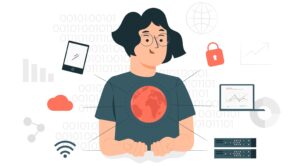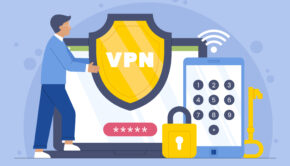Crucial Data Safety Tips for Staying Protected in 2022
As the modern cloud landscape evolves, so does cybercrime. According to Cybercrime Magazine, the damages caused by cyber threats are expected to surpass $6 trillion globally in 2021 alone, while this number could go up to $10.5 trillion by 2025.
These insights should encourage companies to pay more attention to the ways they are protecting their data. Whether the information belongs to your organization or your users and/or customers, and regardless of the type of data, securing your infrastructure, networks and other communication channels should be your top priority.
Aside from potential reputation damage a company may face due to its or its clients’ data being compromised, legal fines and penalties are often even harder to bounce back from. This is why it is highly recommended that businesses take cybersecurity laws very seriously and do whatever is necessary to keep their data and networks as secure as possible.
That said, here are some crucial data protection tips that can help you boost the security levels of your business data in 2022.
Implement a VPN (Virtual Private Network) for Your Business
VPNs are among the best measures a company can use in order to make sure that its local business network is adequately protected from the prying eyes of the public. Professional and custom-tailored VPNs prevent all the devices that aren’t allowed to operate within your network from accessing your data and your channels.
These systems also provide numerous other benefits to businesses that use them, some of which include:
- Improved and more streamlined workflow
- Reduced security costs
- Improved accessibility, etc
Use Firewall and Two-Factor Authentication
A great way to enhance the performance of VPNs even more and add an additional protection layer to your systems is to use a firewall. Firewalls significantly reinforce the security of your internal systems by securing all the traffic that comes from external channels.
It uses two-factor authentication that grants access to the network only to internal users. This means that the staff will need passwords to bypass the firewall protection measures and if a staff member needs to use another device, the access would need to be granted manually.
Protect Your Systems From Malware
The use of malicious software programs like viruses and worms is unfortunately not subsiding. These are capable of easily damaging and destroying both the system and the data of almost any organization.
The main reason why these malicious pieces of code known as viruses are so persistent is that they can replicate themself to another host file, system or program, and remain silent, stealthy and inactive until they are activated. While the biggest problem is that their activation, planned or accidental, can happen without any knowledge or authorization coming from the residential systems and admins.
Computer worms, on the other hand, are self-replicating programs that do not require any segments to be copied to a host program and can spread across the networks without any human interaction. Their primary function is the act of infecting other devices while staying active within the infected system.
The harm from viruses and worms can be prevented by:
- Ensuring all the necessary antimalware software is installed across all the network devices and systems.
- Making sure all security patches and software pieces are regularly updated.
- Raising staff awareness about downloading attachments from unknown sources and senders as well as about clicking suspicious links or visiting untrusted content.
Implement Better Email Security And Compliance

Photo by cottonbro from Pexels
Email platforms remain the most used communication channels among modern organizations, which is why they are still being utilized as one of the main devices for phishing schemes and other types of cyberattacks. This means that businesses mustn’t approach email security lightly, especially as these channels tend to transfer substantial amounts of sensitive data.
By sensitive data, we mean business secrets, client-based information that is typically confidential, business strategies and other types of data that can cause severe damage if stolen or used in malicious ways. This means that proper tackling of email encryption is crucial as it prevents external users from accessing and tampering with your emails.
Another important aspect of tackling email-based data security is automating email archiving and compliance as this data is often required as evidence in potential legal cases or when business audits are due. This can be easily automated by using secure email archiving solutions and retention policies that can help you optimize data storage and always stay compliant with all the necessary rules and regulations.
Think About the Data Handled by Third-Party Vendors
You likely have a solid portion of your data run by third-party vendors. Even the largest cloud services providers themselves use numerous third-party services which means that your data is being handled by multiple parties.
This should be enough of a reason to make sure that your most sensitive data is protected as possible. Admittedly, utilizing third-party cloud services does not mean that your data is automatically exposed to risky ecosystems, but it is highly advised that you have a proper and clear understanding of how your sensitive data is handled and by whom.
If possible, be sure to grant the lowest level of privilege to third-party vendors and applications in terms of their access to your sensitive data and network channels. Similarly, it is a good idea to use strong credentials and to deploy multi-factor authentication strategies.
Regular Data Backups Go a Long Way
Although this may seem like an outdated piece of advice, it is definitely still relevant as numerous companies still do not approach data backups as seriously as they should.
Proper data backups ensure the reliability and continuity of business operations, especially in cases when your systems and data are compromised due to cyberattacks or physical hazards. Being able to restore your data and systems is among the critical measures you can take to ensure minimal downtime and bring your business continuity to the highest levels.
Summing Up
Making sure that your data and systems stay protected should be among your top priorities. It is also quite important to work on implementing a security-focused mindset across all your employees and departments. This way, all your staff will be able to recognize early warning signals of your data being compromised.
Cover Photo by Sora Shimazaki from Pexels
















